- Home
- Claudia Mills
Pet Disasters Page 8
Pet Disasters Read online
Page 8
Mason took off the bow.
At eight-thirty, Brody appeared in the kitchen. Art camp didn’t start until nine o’clock, and it was only a ten-minute walk, but both boys wanted to be early. Mason’s mother was going with them; Mason’s dad and Brody’s parents had to work.
When Mason’s mother saw Dog on his leash waiting with the boys by the front door, her brow creased. “Are you sure you want to take him?” she asked. “Art shows aren’t really places for pets.”
“Yes!” Brody said. “Mrs. Gong said we could bring pets. And Dog wants to go. Don’t you, Dog?”
For an answer, Dog thumped his tail.
They ended up driving to art camp so they’d have the car for carrying everything home afterward. Dog jumped into the backseat next to Mason and Brody as if he were heading off for some wonderful adventure. Would he be as happy if he knew he was heading off to meet a mean boy and his mean dog?
Mason wondered if lots of kids would bring their pets. It wasn’t a pet show; it was an art show. He knew at least one other pet would be there: Wolf.
At the school, Brody took Dog’s leash and led him down the hall to the art room, Mason and his mother following along behind. They were the first ones there, except for Mrs. Gong.
“Brody! Mason!” She shook hands with Mason’s mother and said some untrue things about what a talented artist Mason was.
“I think Mason has really grown as an artist,” she concluded.
Mason’s mother’s face was wreathed in smiles. Apparently she didn’t know that “grown as an artist” was code for “isn’t quite as terrible as he was two weeks ago.”
“And, Brody, this must be your dog. I don’t think I caught his name when you were talking about him the other day.”
“Dog,” Mason said.
She looked bewildered.
“His name is Dog,” Mason explained. And he’s not Brody’s dog, Mason wanted to say.
Two more kids arrived, without pets or parents, and then Nora, with her father but not with her ant farm. Maybe Mason and Brody would go see it someday. Nora’s father looked like her: tall, thin, serious.
Dog seemed completely happy to see Nora when she stooped down to hug him, returning her hug with an affectionate lick. Apparently he had forgiven her for the indignity of the bath. Lots of other kids crowded around Dog, telling him how beautiful he was.
Mason felt himself beaming. He saw that Brody was beaming, too.
By nine o’clock, all the other campers had arrived, except for Dunk. Some had parents with them, and one girl had a pet: a cute cocker spaniel named Lulu. Dog and Lulu sniffed each other politely. Not only was Dog beautiful; he had lovely manners, too.
There was still no sign of Dunk or Wolf. Surely Mrs. Gong hadn’t kicked Dunk out of art camp on the very last day. The best time for kicking Dunk out would have been the first day.
Then Mason heard loud, sharp barks coming down the hall. In answer, Dog and Lulu began barking, too.
Into the art room bounded a big, snarling dog, dragging Dunk behind him. Dunk’s mother brought up the rear. Mason had thought she’d look like a larger, grown-up, female version of Dunk, if there could be such a thing. But instead she was small and gray-haired. Maybe she was Dunk’s grandmother. In any case, she didn’t look like someone who could control Dunk or Wolf, let alone both of them together.
“Good morning, everybody!” Mrs. Gong said. “Children, do see if you can make those dogs be more quiet.”
“Shush!” Brody whispered to Dog, but it was unfair to expect Dog to stop while Wolf and Lulu were still barking.
Mrs. Gong made a short speech about the two wonderful weeks of art camp, and about how proud she was of everybody’s splendid accomplishments. It was a bit hard to hear her over the chorus of barks.
“Parents, thank you for sharing your talented young artists with me,” she finished.
The parents realized that this was their cue to clap.
“And now, I want to announce our winner whose artwork will be displayed for the rest of the summer at the city art gallery in the atrium of the public library.”
Mason saw Brody drawing himself up taller, his face aglow with hope. Even if Brody’s picture of Albert had been ruined by Dunk, and his Monet-inspired painting had been swept away in the creek, Brody’s dragon print was terrific; his origami of a grasshopper, even mended from its tear, was extremely cool; and his blue bowl for Dog was the best bowl in the class.
“It was hard to choose among so many splendid pieces, but I finally decided that our runner-up is the detailed pencil-sharpener drawing by Nora Alpers, and our winner is the glazed ceramic bowl by Brody Baxter!”
The parents applauded again. Most parents were good at acting happy when other people’s kids got picked for things. Mason thumped Brody on his back in celebration.
“Nora, Brody, come up and get the certificates I have for you.”
“Mrs. Gong?” Brody said, staying in his spot, right by the shelf where the ceramic bowls were displayed. “It was nice of you to pick me, but I can’t put my bowl in the library for the whole summer.”
Mrs. Gong looked puzzled. “But why not, Brody? It’s a wonderful bowl!”
“I made it for Dog. Dog’s expecting it.”
“Oh, Brody,” Mrs. Gong said. “Are you sure?”
Brody’s shoulders drooped, in an un-Brody-like way, but he said, “I’m sure.”
“Well, then, Nora, your drawing will represent our camp this summer. Congratulations to both of you! Now, parents, please walk around and admire what everybody has created.”
Mason didn’t say anything to Brody. Did Brody really think giving up the art-show prize was going to make Dog love him better?
“Mason, show me all your things,” his mother said. “Do you have a square in the quilt?”
“Uh-huh,” Mason said.
The art-camp quilt hung on one wall. It had turned out better than Mason had expected, once all the squares were sewn together. He pointed to his square, which really didn’t look any worse than most of the others. Of course, it had been made toward the end of the class, when he had already finished his growth as an artist.
Brody, holding Dog’s leash, showed Dog which part of the mural he had painted. The mural had turned out all right, too. From a distance, you could hardly tell that it had all been painted in one fell swoop just yesterday.
Wolf jumped up on somebody’s parent, and the parent gave a low cry. Dunk just stood there, doing nothing.
“Dunk, maybe you’d better take your dog outside for a while, until he can calm down a bit,” Mrs. Gong said. “Brody, maybe you’d better take your dog, too.”
Lulu’s owner had already left with Lulu, perhaps afraid that Lulu would make too tempting a snack for Wolf.
Dunk managed to yank Wolf over to the door, with Mason, Brody, and Dog trailing behind. Mason thought it was wrong to treat well-behaved Dog the same as badly behaved Wolf.
Once outside, Dunk squinted at Dog. In the art room, Dog had been hidden behind the boys, so Dunk hadn’t been able to see that Dog had a missing leg. Now, as Dog ran in happy circles around Brody, his odd three-legged gait was obvious.
Mason steeled himself for Dunk’s reaction.
“Your dog’s a freak!” Dunk said.
Mason hadn’t practiced a comeback line for that particular comment.
“So are you,” he said. It was the best he could do on short notice.
“At least I have all my arms and legs,” Dunk retorted.
“Yeah, but you don’t have all your brain.”
Before Mason could congratulate himself on an excellent, witty insult, Dunk balled his fists. Mason began to wonder if an excellent, witty insult to a very large, very mean kid was really such a good idea.
As Dunk sprang toward Mason, Dunk let go of Wolf’s leash. In an instant, Wolf sprang toward Dog.
Brody screamed. Mason screamed. Dunk shouted something.
Wolf had leaped on top of Dog. Dog gave one yelp
of pain as Wolf kept on savagely growling.
Suddenly a jet of water knocked Wolf sideways. Nora’s father had run outside and seized the hose lying on the lawn for watering the flowers by the art-room door, turned it on, and pointed the nozzle toward Wolf. Other parents had streamed outside, too; Mason heard his mother shouting his name.
Wolf jumped out of the way of the blast.
Dog lay on the grass, one ear ripped, a gash by one eye, bleeding. He was drenched from the spray of the hose, but too weak to crawl away.
Brody was sobbing.
Dog never would have gotten hurt if you hadn’t wanted to bring him to the art show, Mason thought.
Unbelievably, Dunk was crying, too. “I didn’t mean to. I didn’t mean to,” he blubbered. “He’s not dead, is he? Brody, is your dog dead?”
Both Brody and Mason were crouched over Dog’s still body, but Mason was the one who had his face right next to Dog’s face, aching to feel Dog’s gentle breath—in, out, in, out—to feel the beat of Dog’s faithful, loving heart.
Dog opened one eye, the eye that wasn’t injured.
He gave one feeble lick to Mason’s wet cheek.
Mason’s own heart, which had been so close to breaking, swelled inside his chest until he could feel it straining against his ribs, pounding hard enough to shatter them.
“He’s not dead,” Mason said. “And he’s not Brody’s dog. He’s my dog. Mine.”
13
Together, without speaking, Mason and Brody helped Mason’s mother lift Dog, who still lay motionless on the grass, into the backseat of the car so that they could drive him to veterinary urgent care. Nora’s father gave her the address. Like Nora, he really did seem to know everything. Nora looked pale and stricken; for once, she didn’t seem in control of the situation.
Dunk was still bawling as Mason and Brody settled Dog carefully in place between them. “I didn’t mean to! Don’t die, Dog. Please don’t die!”
Mason and Brody ignored him.
They had gone a block when Mason’s mother said, “We didn’t take your artwork.”
As if either Mason or Brody cared about anything except whether Dog got well.
“That’s okay,” Brody said. Then he remembered: “My dog bowl! I need to get my bowl for Dog!”
“I’m sure Mrs. Gong will keep all of your work, so we can pick it up later,” Mason’s mother said. “Dog will get his bowl! Don’t worry, Brody, honey.”
There was an awkward silence. Mason knew that this was the time for him to say, When I said Dog wasn’t your dog, I didn’t mean it. I meant that I love Dog, too. I want him to belong to both of us.
He couldn’t make himself say it. He didn’t want Dog to belong to both of them. There were some things you could share, like a bag of popcorn where you could each eat half, or even a bike, where you could take turns riding it. There were some things you couldn’t share. Like a dog.
At urgent care, the vet who examined Dog was a small, slim woman who seemed to know exactly how to handle an injured dog. She put medicine on Dog’s wounds and bandaged his torn ear. Then she gave Dog a shot to prevent infection and reduce pain.
Mason had been afraid Dog might have to stay overnight in the animal hospital, but the vet said he could go home.
“Home” meant Mason’s house. Not Brody’s.
“The main thing he needs right now is lots of rest and lots of love,” the vet said.
Mason could give him lots of love. He could give him all the love a dog could ever want.
It was hard carrying Dog back to the car, and then carrying him from the car into the house, because Dog was so sleepy now from the medicine. All three of them helped—Mason’s mom, Mason, and Brody. Finally, Dog was comfortable on his dog bed, which had been moved into the kitchen right next to his food and water bowls. It was the first time Dog had used his dog bed since the night of the thunderstorm, when he’d begun sleeping on Mason’s bed beside him.
“I guess I’d better go home now,” Brody said stiffly. Brody’s sisters were there, so he wouldn’t be alone.
Mason knew Brody wanted him to say, No! Stay here in case Dog wakes up and misses you.
“Okay,” Mason said. “See you later.”
He didn’t turn around to see Brody walk away.
Dog slept the whole afternoon. Mason sat beside him, watching him sleep, listening to him breathe. The slow in-out, in-out of Dog’s rising and falling breath didn’t comfort him the way it used to.
He had gained a dog. He had lost a friend.
He had gained the best dog in the whole world.
He had lost the best friend in the whole world.
The doorbell rang twice during the long hours that Dog slept, but Dog, who once would have rushed to the door to be the official watchdog and greeter, never stirred.
The first time it was Nora and her father, carrying a cardboard carton.
“We brought you your stuff,” Nora said when Mason came to the door. “You know, your artwork from camp. How is Dog? Is he okay?”
Mason nodded. “He’s been sleeping ever since we got home from the vet. The vet said he’ll be okay. How was the rest of the art show?”
Nora shrugged. “The parents looked at everybody’s art, and then they helped pack it all up. That’s all. Dunk kept crying. He cried a lot, Mason.”
“Wolf could have killed Dog,” Mason said. Dunk should be crying.
“I know. We have Brody’s stuff, too. Can we leave it with you?”
Mason hesitated. “Brody lives next door. If he’s not there, you can put the box on the porch.”
Nora’s eyes widened. Mason knew that Nora, who figured out everything, must have figured out that Mason and Brody weren’t friends anymore.
“Okay,” Nora said. She turned to her dad, who had been waiting patiently, without saying anything. “If you ask me,” Mason heard her say as they headed out the door, “there’s a lot to be said for an ant farm.”
The second time the doorbell rang, it was—Dunk! His already pudgy face was even pudgier, swollen from crying. He was carrying something: the enormous, ugly bowl he had made for Wolf.
“This is for Dog,” Dunk said. “A get-well present from me and Wolf. So he’ll know that I’m sorry and Wolf’s sorry, too.”
Mason was starting to believe that Dunk truly was sorry. But somehow he doubted that Wolf was overcome with guilt about what he had done. Wolf hadn’t looked like a dog that had a very sensitive conscience.
Mason wasn’t sure what to say. Usually when one person said, “I’m sorry,” the other person said, “That’s okay.” But Dog’s being hurt—almost killed—wasn’t okay.
“Well,” Mason said. “Thanks for the bowl.”
“I’m sorry I made fun of Dog, too,” Dunk said. “It’s sort of cool, having three legs. Do you know how he lost his other leg? Maybe it was in a big dogfight and he made the other dog look even worse? So Dog is sort of like a pirate with a peg leg and an eye patch.”
“Maybe,” Mason said.
Or maybe not.
Thinking of Dog in an eye patch made Mason remember Hamster, all dressed up four months early for Halloween. He hoped Hamster was happy, wherever he was. And Cat—he hoped she had found a new home, with a non-allergic person who could love her and pet her and listen to her purr. Even Goldfish—Mason hoped there was a fish heaven, where Goldfish could swim all day in the sunlight.
After Dunk left, Mason carried Dog’s old food and water bowls out to the garage and crammed them onto the shelf with Goldfish’s bowl, Hamster’s cage, and Cat’s litter box. Then, back in the kitchen, he filled Dunk’s bowl with dry dog food. He found his own dog bowl in the art-camp carton, filled it with water, and put it next to Dunk’s. However patchy the glaze, it looked a thousand times better than Dunk’s bowl, that was for sure.
One bowl for food and one for water.
So there wouldn’t have been any need for Brody’s bowl, anyway, the beautiful bowl that Brody had glazed in Dog’s favorite col
or, the deep-blue bowl that Brody had made for Dog with so much care and concentration, the award-winning bowl that Brody had refused to send to the library art display just so that Dog could have it.
Behind him, as he turned to go upstairs, Mason heard the soft padding of Dog’s big feet.
“Dog!” Mason wrapped his arms carefully around Dog and gave him a gentle hug. Then he let Dog lap at his water and nibble some of his food. Dog didn’t seem all that hungry yet, mainly just thirsty.
“Oh, Dog.”
He hugged Dog again, and Dog licked his face.
For the second time that day, Mason, who never cried, felt like crying.
Here was the question: was Dog’s heart big enough to love two boys?
Mason already knew the answer: Dog’s heart was as big as the entire world.
The real question was: how big was Mason’s heart? There was only one way to find out.
Mason headed out the back door, and Dog followed. Looking friskier every minute, Dog bounded behind Mason, across Brody’s lawn and up to Brody’s front door, tail wagging as if Dog had suddenly remembered how to wag it. Mason rang the doorbell. Usually he didn’t ring or knock; he just walked in, as Brody did at his house. But today was different.
When Brody answered the door, Dog’s tail went even wilder at the sight of Brody. Then Brody flung open the door and was hugging Dog, and Dog was licking Brody’s face.
“Dog came to get his blue bowl,” Mason told Brody. Dunk’s bowl could go out in the garage with all the other discarded pet things.
Mason took a deep breath. “And he came to get his new name. You said you didn’t want to call him Dog. So what should we call him? What should we name our dog?”
Brody’s face shone like—well, like the way Brody’s face always shone, but even shinier now, like a hundred shining Brody faces.
Without a pause, Brody answered. “ ‘Dog’ might be a dumb name, but it’s his name now. It just is. It can be short for ‘Dog of Greatness’: D.O.G. But we can just call him Dog. Okay, Dog?”
Dog licked Brody’s face. Then he licked Mason’s face.

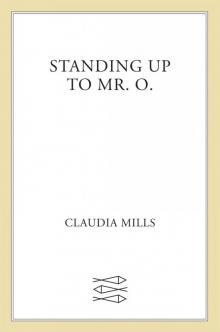 Standing Up to Mr. O.
Standing Up to Mr. O.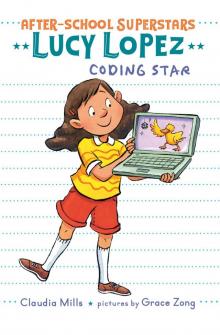 Lucy Lopez
Lucy Lopez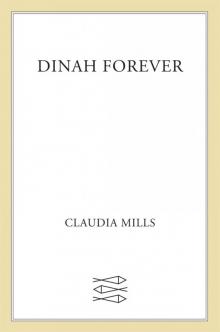 Dinah Forever
Dinah Forever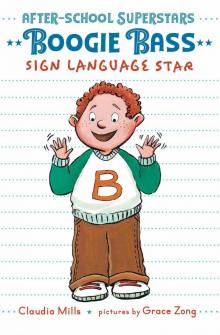 Boogie Bass, Sign Language Star
Boogie Bass, Sign Language Star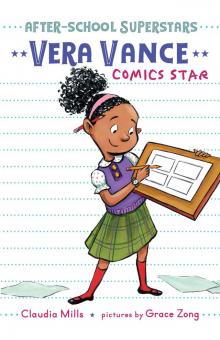 Vera Vance: Comics Star
Vera Vance: Comics Star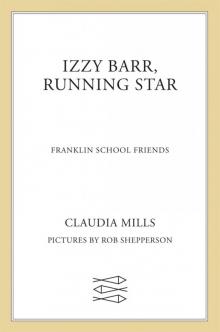 Izzy Barr, Running Star
Izzy Barr, Running Star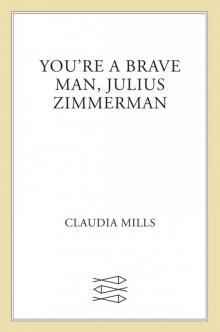 You're a Brave Man, Julius Zimmerman
You're a Brave Man, Julius Zimmerman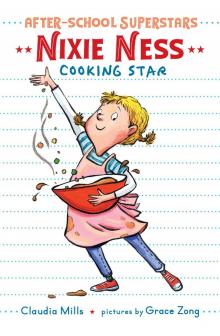 Nixie Ness
Nixie Ness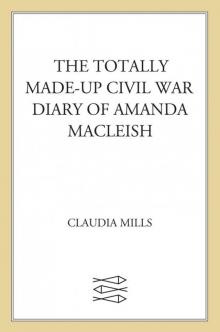 The Totally Made-up Civil War Diary of Amanda MacLeish
The Totally Made-up Civil War Diary of Amanda MacLeish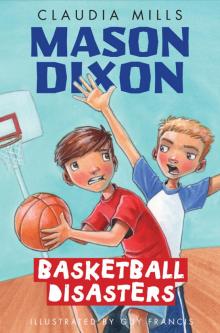 Basketball Disasters
Basketball Disasters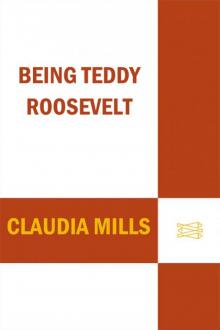 Being Teddy Roosevelt
Being Teddy Roosevelt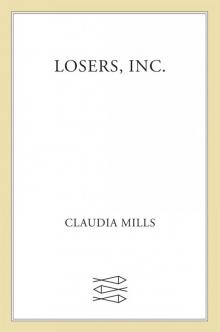 Losers, Inc.
Losers, Inc.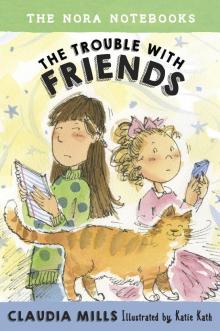 The Trouble with Friends
The Trouble with Friends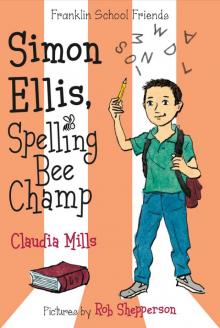 Simon Ellis, Spelling Bee Champ
Simon Ellis, Spelling Bee Champ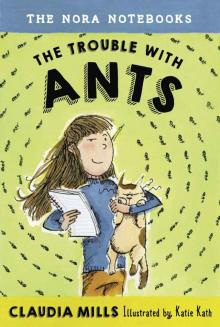 The Nora Notebooks, Book 1: The Trouble with Ants
The Nora Notebooks, Book 1: The Trouble with Ants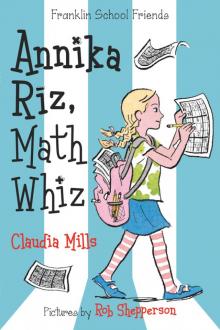 Annika Riz, Math Whiz
Annika Riz, Math Whiz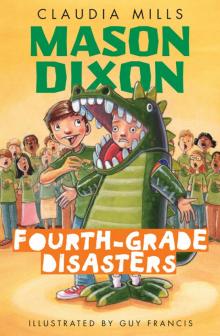 Fourth-Grade Disasters
Fourth-Grade Disasters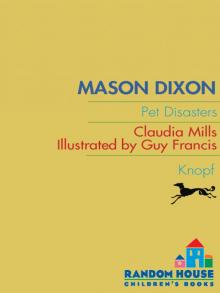 Pet Disasters
Pet Disasters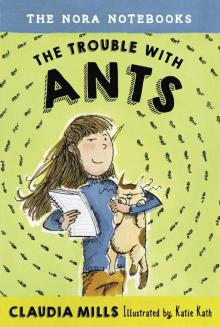 The Trouble with Ants
The Trouble with Ants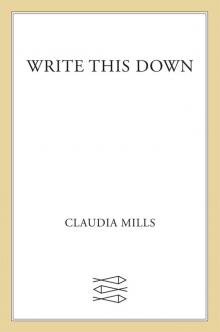 Write This Down
Write This Down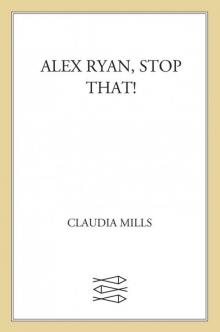 Alex Ryan, Stop That!
Alex Ryan, Stop That!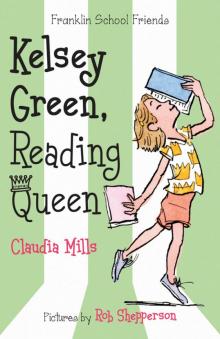 Kelsey Green, Reading Queen
Kelsey Green, Reading Queen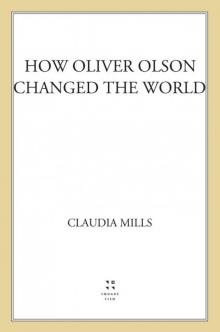 How Oliver Olson Changed the World
How Oliver Olson Changed the World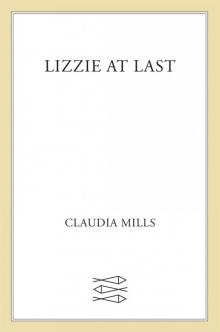 Lizzie At Last
Lizzie At Last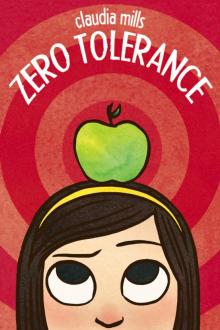 Zero Tolerance
Zero Tolerance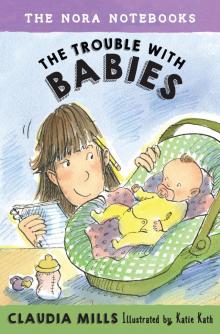 The Nora Notebooks, Book 2
The Nora Notebooks, Book 2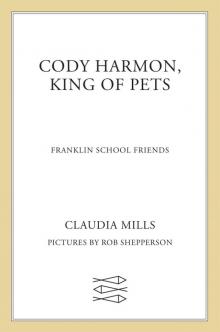 Cody Harmon, King of Pets
Cody Harmon, King of Pets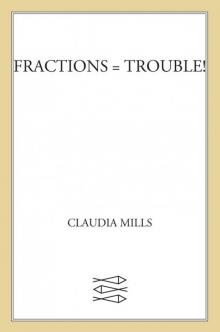 Fractions = Trouble!
Fractions = Trouble!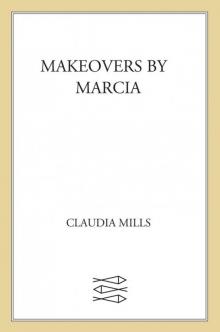 Makeovers by Marcia
Makeovers by Marcia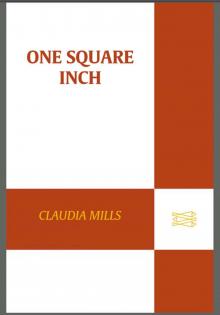 One Square Inch
One Square Inch